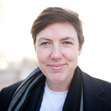Meg-John Barker's Blog, page 20
October 15, 2016
My self-help project
I recently wrote a blog post for the Open University CCIG ‘Methods in Motion‘ blog about my ongoing project of producing various forms of self-help (books, blog posts, zines, etc.) I thought I’d include the post here as well to update you on how that project is going and where I’m headed next. If you’re interested in research methods, check out the original post and other ones in that series…
My project is quite an unusual one for an academic. It doesn’t involve designing and conducting experiments or interviews, but it does include several different kinds of research. It fairly rarely involves me writing in academic language, but it does draw on academic theory. It doesn’t require much in the way of funding, but it manages to reach a lot of people.
My project is to produce self-help with a difference. A lot of self-help is produced by people without much knowledge of theory and research; mine is rooted in what we know from academic studies and philosophical ideas, and tries to communicate this in an engaging and accessible way. Most self-help takes a rather individualistic approach to people: ‘this is what is wrong with you and this is how to fix it’; mine takes a more psychosocial perspective: ‘this is what’s wrong with wider cultural assumptions, systems and structures, and here are some ways in which you might navigate them differently’. A lot of self-help promises a one-size-fits-all solution; mine emphasises diversity and the fact that different things work for different people and at different times. I’ve sometimes described it as ‘anti-self-help’ because it doesn’t locate our problems in us as individuals, and its starting point is a gentle criticism of mainstream self-help.
But how is the project of producing self-help a research project, and what methods does it use? Actually my project weaves together various kinds of research and method in order to further the main goal of creating useful self-help materials. You can see this illustrated in the image below.
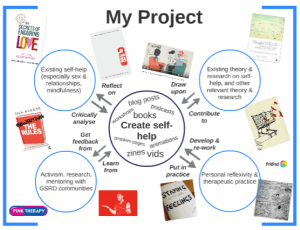
Starting in the top right of the diagram, perhaps the most obvious way in which my project is a research project is that it draws on academic research and theory: notably the research that’s been done on self-help itself. For example, academics have studied which self-help techniques are helpful to people struggling with different issues, and they’ve also done more critical research about the assumptions and norms that are perpetuated by mainstream self-help. Some of my projects are also attempts to develop methods that get the findings of a particular study – or the ideas in a particular theory – out to the general public in an accessible way. For example, The Secrets of Enduring Love presents the findings of Jacqui Gabb’s OU Enduring Love? Project. Queer: A Graphic History (with artist Julia Scheele) is a comic about what queer theory is and how it might be useful in people’s lives.
Moving anticlockwise to the top left, I’ve also conducted my own research into self-help, which informs my wider project. For example, Ros Gill, Laura Harvey and I are writing an academic book based on our research on sex advice. The method for my part of that was to study 62 sex manuals (I don’t recommend it!) to discover the messages they tend to give people about how to have enjoyable sex. My critical analysis of these books, and other media, informed the sex advice book that I’ve recently written with sex educator, Justin Hancock: Enjoy Sex (How, When and If You Want To).
Down into the bottom left corner, much of my self-help is informed by the research I’ve conducted over the years with members of gender, sexual, and relationship diverse (GSRD) communities. I’ve always felt that the common psychology question of how GSRD can be explained is a problematic one, and that it’s more valuable to ask instead what can be learnt from people who are doing gender, sexuality, or relationships in different ways to the current ‘norm’. As Darren Langdridge, Helen Bowes-Catton, and I have explored in our collaborative work, the methods and theories that allow you to openly reconsider what sexuality and relationships can be are very different to those that start from a closed definition and investigate within those pre-established boundaries. In my book Rewriting the Rules I drew on a lot of this kind of research to give people a sense of all of the different ways in which they could manage their relationships. There’s a feedback loop here too, because I want to keep learning from my GSRD readers. I’m currently starting work on a second edition of Rewriting the Rules and I’ll be conducting survey and focus group discussion research to find out what readers found useful – and less so – to inform how I edit the book.
Finally, moving around to the bottom right, my self-help is also grounded in methods of personal reflection and therapeutic work. My own experience – and that of my clients – is a constant testing ground for what is actually useful in people’s lives. For example, I publish a lot of zines to take people through activities that I, and clients, have found helpful. I’m currently doing some autoethnographic work (that’s where you do in-depth research on your own experience) about what people can learn from tuning into their sexual fantasies. The first glimpse of this work can be found in The Psychology of Sex, which is coming out in 2017. My forthcoming books on gender and on moving beyond binaries with Alex Iantaffi also draw on our own lives and reflections, as well as years of therapeutic work.
Finally, moving back to the centre of the diagram, there’s a kind of research method involved in the creation of the self-help materials themselves: perhaps more akin to the research conducted by people in the humanities, particularly in creative writing. I’m constantly engaged in a dialogue with people about what they’d find most useful, and what formats would be most accessible to diverse audiences, hence my experimentations with different kinds of books, blogs, podcasts, videos, comics, and various other media.
There’s a lot of joy, for me, in the dance between the five related sub-projects depicted here. I enjoy moving between methods, topics and formats – from talking with clients, to collaborating on a zine, to attending a community event, to recording a podcast, to reading a colleague’s latest paper, to writing my personal journal, to analysing some blog posts about a particular issue, to speaking on a panel. I find a deep pleasure in the way that all of these parts of the project weave together and inform each other in a kind of ongoing conversation, and I love that this way of doing things may help to rewrite the rules of what academic work looks like as well!
Find out more:
Keep your eyes peeled for the new megjohnandjustin website which Justin Hancock and I are currently putting together. There’s also more information about my anti-self-help project on the CCIG website.
October 12, 2016
New website!
Today I can reveal my new-look website. Isn’t it great?!
Hopefully it’ll be easier now to get information about my books, zines, videos, etc. as well as following my blog posts (which I hope to write more of now this is done).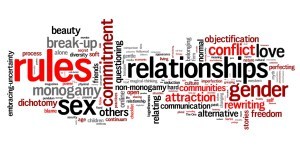
Many thanks to the Open University Centre for Citizenship, Identities and Governance for paying for the revamp, and most of all to the wonderful Hey Kiddo for doing the hard work. If you’re looking for stationery, prints, websites, logos or branding I recommend them highly – you can see what a great job they’ve done here.
And now for another blog post…
September 28, 2016
White House Bisexuality Briefing
On 26th September 2016 I attended a historic bisexuality briefing at the White House. Bisexual community leaders had met with the White House on previous occasions, but never before had the meeting been live-streamed, recorded, and made public during and after the event. There were well over a hundred bisexual activists in attendance, and the two hour event mixed together talks and panels on vital topics as well as some powerful music, poetry and other creative input about bisexual experiences.
It was extremely valuable to me to have the opportunity to learn about how bisexual matters are being discussed and engaged with in the US. Speakers emphasised many of the same issues that affect bisexual people globally: invisibility, discrimination from both straight and gay communities, and high rates of mental health struggles due to biphobia. However, it was also striking how much careful attention was paid to intersectionality. That is the idea that sexuality intersects with many other aspects of experience and identity (race, gender, class, ethnicity, age, disability geographical location, etc.) to produce unique experiences of being bisexual in different groups and individuals. So we heard people speaking about bisexuality from diverse positions, and emphasising the importance of listening to diverse voices, and targeting support to the places where it is most needed.
Another aspect of intersectionality is the idea that we cannot fight each battle separately – racism, sexism, biphobia, transphobia, etc. – just focusing on the issues that obviously impact ourselves. Rather many of the same processes underlie all of these injustices, and they impact everyone.This essential idea comes from black feminism so it was wonderful to be part of an event which foregrounded the voices of women of colour particularly, as well as trans people, and where the #blacklivesmatter message was central. We heard that black young people are particularly likely to identify as bi, and that bi and trans women of colour are particular targets of violence, discrimination, and sexual harassment.
Victor J. Raymond also spoke powerfully about the intersections between bi+ people and Native Americans, and the importance of recognising diverse ways of understanding sexuality and gender across cultures and communities. Solidarity in this area is vital at the present moment when a historically large number of indigenous tribes are working to resist the Dakota access pipeline and to protect this essential water supply for everyone.
My panel was focused on bi, pan, fluid and queer communities, so I spoke about the need to increase awareness about the high numbers of people whose sexuality and/or gender experience is non-binary (over a third according to recent studies), and the impact this has when living in a very binary dominant culture. It was wonderful to receive such a positive response from the audience when mentioning the Open University published Bisexuality Report, and many people told me how helpful they had found that. However, we have a long way to go in the UK LGBTQ and bi+ communities in addressing intersectionality and foregrounding the most marginalised voices, rather than marginalising them further. Also it would be great to see the UK government engaging with bisexuality as seriously as the Obama administration clearly does.
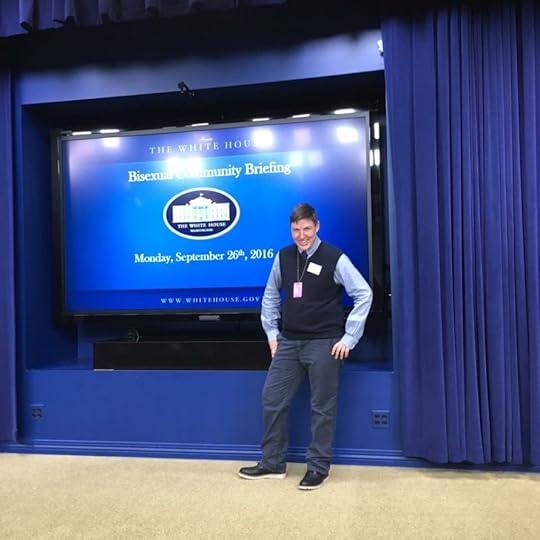
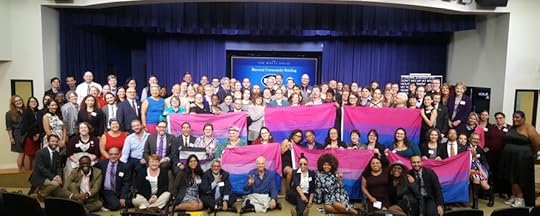
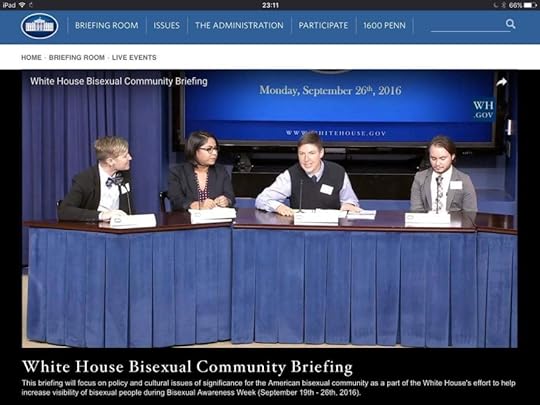
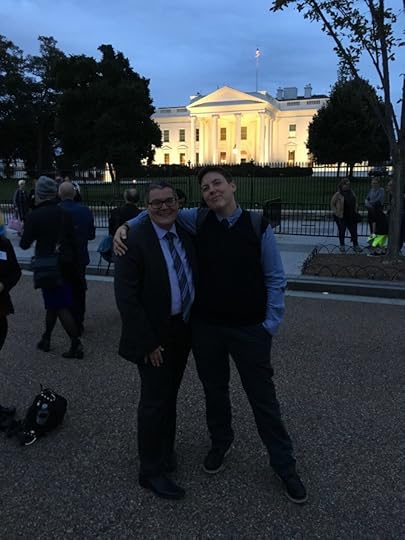
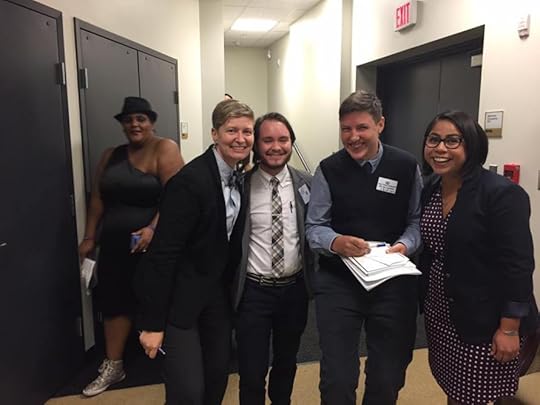
September 7, 2016
British Bisexuality: Purple Prose out now!
Last week saw the launch of a book project that I’m very excited to be part of: Purple Prose.
This collection, edited by Kate Harrad, brings together experiences from a diverse spectrum of bisexual folk in Britain today. It works as a how-to guide to British bi communities and identities, as well as providing a fascinating insight into the wide range of experiences under the bisexual umbrella.
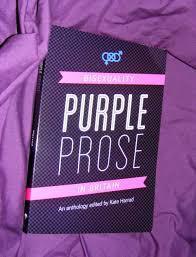
A particular strength of the book is its focus on intersectionality. Most writing on bisexuality, including The Bisexuality Report which I was part of, focus on bisexual people as a fairly unified group: how they are represented, the challenges they face, bi-specific discrimination, etc. The problem with this approach is that bisexual experiences – like all experiences – are very different depending on other intersecting aspects of identity and experience such as gender, class, race, disability, geographical location, generation. Also, as Shiri Eisner points out, there are vital links between bisexual activism and feminist, trans and queer activism, anti-racism, and other anti-oppression movements, which are vital to attend to because a single-issue kind of activism can’t get us very far.
For these reasons it’s great to see a book in which at least half of the chapters are devoted to specific intersections (e.g. ‘Bisexual and disabled’, ‘Bisexual Black and Minority Ethic People‘, ‘Bisexuals and Faith’).
Even within these chapters there is a clear sense of the range of experiences that exist amongst any specific group, such as older bisexual people or non-monogamous bis, for example. In the chapter that I co-edited with Fred Langdridge, ‘The Gender Agenda’, we decided to foreground the experiences of non-binary bisexual people, given that there are already books about bisexual women and bisexual men, but none on this topic. While we included the voices of bisexual people of many genders, we gave specific attention to those who are non-binary in terms of both their sexuality and their gender. Even within that group we discovered many differences in relation to how they related to the term ‘bisexual’, how they experienced their gender and sexuality, whether these things changed over time or not, and how they were navigated in their close relationships and communities.
We still have a long way to go on bisexuality in Britain given that the biggest group under the LGBT umbrella still has the highest rate of mental health problems, and gets the least attention in policy and practice, both outside and within the LGBT sector. Purple Prose is definitely a step in the right direction.
August 8, 2016
New article on valuing different kinds of relationships equally
I recently did an interview for a great piece that appeared on The Establishment over the weekend about Relationship Anarchy. Relationship Anarchy is one of the terms that’s emerged in recent years for a relationship style that involves things like:
Valuing different kinds of relationships at a similar level (whether they are romantic, collegiate, platonic, family, sexual, etc.)
Negotiated mutually agreed-upon ways of doing things rather than conforming to a strict set of relationship rules.
Prioritising the freedom and independence of individuals and relationships rather than a sense of people belonging to each other, or relationships being constrained or limited due to their label or cultural assumptions (e.g. about what a friendship or romantic relationship should be like).

If you want to think more about your own relationship styles you might want to check out this relationship user guide zine that Justin Hancock and I recently put together. Justin and I are also currently working on a joint website about sex and relationship advice: coming soon!
Here’s the start of the RA article with a link to where you can read the rest if you’re enjoying it…
Relationship Anarchy Takes The Judgment Out Of Love
by Clare Wiley
Mel Mariposa Cassidy has lots of partners in her life. There’s the boyfriend who lives nearby in her East Vancouver neighborhood, and the partner who’s a few hours away on Vancouver Island. Then there’s the man who lives in the U.S.—they don’t see each other very often, but he’s the one who feels most like a soulmate. And that’s not to mention Mel’s closest friend—a woman she describes as her “platonic-ish life partner.” Meanwhile, she lives with her best friend, an ex-lover who’s listed as her emergency contact.
But Mel isn’t polyamorous. She’s a relationship anarchist—meaning she doesn’t distinguish between the romantic, sexual, and platonic relationships in her life. Members of the community she belongs to have decided that traditional monogamy, and often polyamory, aren’t working for them. They want less structure, fewer hierarchies. And so they’ve committed to a model that’s at once simple and radical: They give all their relationships equal footing.
Mel has an ongoing conversation with each of her partners to continuously discuss and examine the partnership, establishing what everyone wants to get out of it. She also makes sure that everyone’s clear that no one person is privileged above any other.
“It allows me to be very true to where I’m at in any given moment,” Mel says. “So if I’m not feeling like I want to have a date with someone, then I can just say ‘hey you know what, I want to have more time alone right now.’ It’s about finding that common ground from moment to moment. There’s a lot less complacency in relationship anarchy.”
The term “relationship anarchy” was coined by the Swedish activist and creative Andie Nordgren. In 2012, she wrote the Relationship Anarchy manifesto, laying out guidelines for a radically different approach to relationships. These include “Love and respect instead of entitlement” and “Heterosexism is rampant out there, but don’t let fear lead you.” Other guidelines declare “Trust is better” and “Build for the lovely unexpected,” which encourages followers to be spontaneous.
“In RA, the idea is that all kinds of relationships are important,” says Dr. Meg-John Barker, a relationship anarchist as well as a senior psychology lecturer and sex and gender therapist. “You don’t privilege romantic or sexual relationships over other kinds, such as platonic relationships. RA also tends to strongly emphasize the freedom of those involved, and ongoing negotiation of the relationship, whereas some versions of polyamory are more rules or contract based.” Read more…
Meg-John Barker's Blog
- Meg-John Barker's profile
- 333 followers


